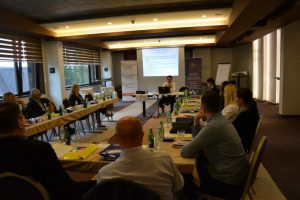 Sarajevo Open Centre, with the financial support of Heinrich Boel Stiftung, in cooperation with Centre for Judicial and Prosecutorial Training of BiH (CEST FBiH) on 23th and 24th of May in 2017, held the two-day training for the prosecutors and judges. The training was on matters of human rights and better understanding of issues that lesbians, gay, bisexual, trans and intersex persons in BiH deal with. It is called “Anti-discrimination and Criminal Law: combating violence against LGBTI persons, experiences from BiH and the Region”.
Sarajevo Open Centre, with the financial support of Heinrich Boel Stiftung, in cooperation with Centre for Judicial and Prosecutorial Training of BiH (CEST FBiH) on 23th and 24th of May in 2017, held the two-day training for the prosecutors and judges. The training was on matters of human rights and better understanding of issues that lesbians, gay, bisexual, trans and intersex persons in BiH deal with. It is called “Anti-discrimination and Criminal Law: combating violence against LGBTI persons, experiences from BiH and the Region”.
The main goal of this training was to introduce the judiciary community with the promotion of anti-discrimination and criminal law and practice in the field of human rights protection with emphasize on LGBTI persons as a marginalized social group, important for their work in judicial institutions. Also, the aim was to senzibilize and introduce judges and prosecutors with effective ways of protecting and prosecuting human rights violations based on sexual orientation, gender identity and sexual characteristics in BiH, in accordance with domestic legal regulations and in compliance with international and regional legal standards.
During the first day of the training, we talked about LGBTI terminology, prejudice and stereotypes, more precisely about Anti-Discrimination Law. More precisely, there we talked about the legal framework applicable to the suppression of discrimination based on sexual orientation and gender identity, as well as on specific cases of violence in BiH, the region and the practice of the European Court of Human Rights. By the end of the first day, the participants had a chance to, through the concept of human library where people are “books to be read”, meet LGBTI persons and talk about their personal stories, experiences and problems that they have.
During the second day of the training, we talked about hate crimes: contextual and legal framework, and about specific cases in which the prosecutors and judges could see how and to what extent hate crimes affect LGBTI persons, as one of the social categories mostly affected by these crimes, and which investigations and judgments are adequately implemented and which are not.